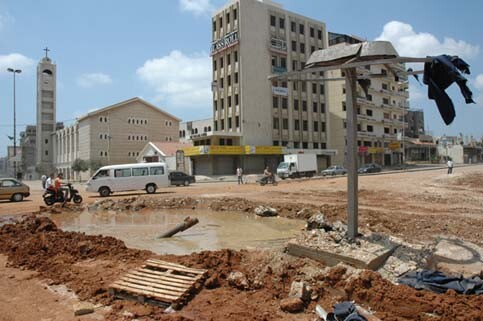IRIN 18 July 2006

The aftermath of attacks by Israel on Lebanon, July 16, 2006. (IRINNews/Peter Speetjens)
The government has set up four welcoming centres on the Syrian-Lebanese border to receive people fleeing ongoing aerial bombardments by Israel. Damascus has also opened up government schools and other institutions to Lebanese nationals who have nowhere to stay.
A senior Syrian Red Crescent (SRC) official told IRIN on Tuesday that the aid organisation had established a direct telephone line to assist Lebanese nationals who are stuck without money or shelter. According to SRC head Abdul-Rahman Attar, some 20,000 Lebanese, Arab and other travellers traverse the four border crossings every day. Attar noted that the centres had received some 2,400 Lebanese nationals on Tuesday, most of whom were bussed into Syria with assistance from the government.
Food and blankets are also being supplied at border points. SRC officials pointed out that eight convoys of aid provided by civil organisations, in addition to 15 convoys from Kuwait, had crossed into Lebanon on Tuesday.
Mohamad Durz, a 47-year-old Lebanese national staying at an SRC centre in Damascus, said he left Lebanon after Israeli air strikes had destroyed targets next to his home. “I came to the centre to get help, food and blankets,” he said, adding that he planned to stay with his Syrian relatives.
Official Syrian news agency SANA reported on Tuesday that four children had been hospitalised in the north-western city of Tartous after making the crossing. The children reportedly
“fainted due to the psychological pressure and fatigue they suffered during the trip”, the news agency stated.
Officials note that many of the incoming Lebanese hold dual nationalities and plan to move on to other countries. “After 11 days of vacation, I now return to Sweden having lost two of my relatives in the war,” said Mouna Bdeiri, a 50-year-old Lebanese-Sweden dual citizen. Waiting in front of the Swedish embassy for evacuation, she added: “I left the war, but my heart is still there, with my relatives.”
Minister of Labour and Social Affairs Diala al-Hajj Aref said on Monday that Syria was prepared to receive people fleeing the violence. She added that the ministry was providing transportation from the border into Syria.
The overwhelming support shown for the Lebanese people comes after a year of frosty relations between Damascus and Beirut, following the assassination of Lebanese Prime Minister Rafik Hariri in February of 2005. While a UN inquiry implicated Syrian officials in the crime, Damascus has consistently denied any involvement.
On Tuesday, a group of Syrian school children sent a message to UN Secretary-General Kofi Annan in which they expressed worry over the “unjust aggression on the Lebanese and Palestinian people and their national resistances”.
Israel began bombing Lebanon on 12 July after Hizbullah militants based in southern Lebanon kidnapped two Israeli soldiers.* Hizbullah says it will only release the hostages in exchange for Lebanese prisoners held in Israel.
*Editor’s Note: The dictionary definition of the word “kidnap” necessitates that the abduction of a person is illegal. As the Israeli soldier was part of an occupying force, captured during a military raid against a military target, in international law he is considered to be a “prisoner of war”, not a kidnap victim. The rules governing the treatment of prisoners of war are spelled out in the third Geneva Convention of 1949, article 13 of which requires that POWs “must at all times be treated humanely”.
Related Links